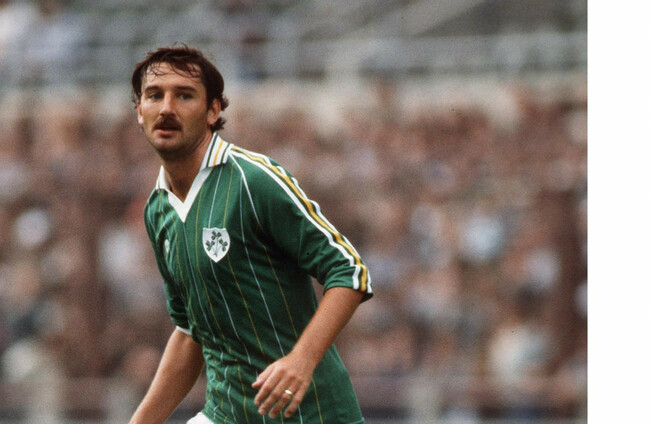“LIFE IS GOOD”, says Mickey Walsh, smiling the smile of a man who has seen his world repaired.
It’s three years since the rupture.
Standing in the lobby of a hotel on the Copacabana on the penultimate day of his holiday, Walsh complained of a pain in his leg to his wife Christine, who instantly diagnosed a problem. It was a stroke, and Walsh went from hotel lobby to ICU in the space of 10 fraught minutes.
He credits the quick thinking of his wife and the hotel staff for greatly limiting the potential damage, if not saving his life. Timing played its part, too: a day later, Walsh was slated to be on his flight home.
He spent a week in ICU, another fortnight in hospital and was then repatriated to the UK where he did physiotherapy for four months before returning to his home in Portugal. It’s from his home in Porto he speaks to me, beneath the sun and surrounded by children and grandchildren, enjoying the spoils of recovery and perspective.
“They got it early, and I was affected down my left side”, Walsh tells me over the phone from his home outside Porto.
“I can walk four or five kilometres a day with the use of a stick, more as a support than a necessity. I can drive, I can travel, I can eat, I like a pint. There are a lot of people worse off than me.”
He packs the stick in the car wherever he goes, he says, and adapting to that reality has been the biggest challenge.
“Psychologically, it affects you. When you’ve been an athlete, you don’t want people to pity you. But mentally I’m pretty strong. That’s the hardest part: the mental side of things, rather than the physical side of things.
“I can dress myself and shower myself so I could live independently, but thank God I have a lot of family and friends around. It’s not a normal life now, but it’s a good one.
“I am getting on with things, I can still travel and enjoy life. Especially now, I’ve got the grandchildren here, I’ve got the kids here. It’s like a B&B here with all the coming and going, but it’s great. Life is good.”
At one point during our conversation, Walsh says it’s a miracle he is still here, but his life has been punctuated by them: in 1985, for instance, he and Christine became parents to the world’s first-ever set of non-identical quadruplets born under IVF.
Their Dad is still recognised in Porto on a near-daily basis and the night before we spoke, he obliged when a Porto-supporting family at the table next to him at a restaurant asked him to sing Happy Birthday to their 80-year-old mother.
That Walsh is still remembered by Porto fans is unsurprising. He scored 42 goals in 85 games for the club across a six-year stint which included back-to-back league titles, one Portuguese Cup, and an appearance in the club’s first-ever European final, a Cup Winners’ Cup defeat to Giovanni Trapattoni’s Juventus.
Walsh made his breakthrough at Blackpool – a stint garlanded by the Goal of the Season award for a fabulous solo effort against Sunderland in 1975 – and joined Everton in 1978 for what proved to be a brief, unhappy spell, though he was part of a team that recorded a first win over then-European champions Liverpool in seven years.
He then moved to QPR, which again didn’t go to plan, and a disagreement with his manager in 1980 led him to an opportunity in Portugal.
“I’d fallen out with Tommy Docherty – which wasn’t difficult – and I’d had a bad couple of years with injuries and lack of form at Everton and QPR, so I wanted to get my life back on track, really. I saw this as an opportunity to go to a top club, play in Europe, and thank God it worked.
“Once I proved on the training pitch that I was as good or better than the players I was with, they accepted me. When I first came they were a little bit, ‘This is a foreign guy coming to our club to take one of our players positions’ but you get their respect once you are earning them their bonuses!”
They also earned a vaunted reputation. Back-to-back league titles in 1985 and 1986 were the clubs’ third and fourth titles in 27 years, and the ’85 title broke a six-year duck. They haven’t gone as long without a title since.
“We are looked upon as the guys who started the modern Porto”, says Walsh. “We got to the final of the Cup Winners Cup in ’84, and we were probably the best team in Europe. We got beaten 2-1 by Juventus, and that was the first major European final we had ever been in.”
They backboned the Portuguese national team, with seven Porto players featuring in a classic semi-final defeat to Michel Platini’s France at Euro 1984.
“If I were Portuguese, I’d probably have been in that national team”, laughs Walsh.
Instead he played for Ireland, qualifying through his Mayo-born father. The stand-out moment was his winning goal against the Soviet Union in 1984, a goal widely replayed last year to mark the passing of the man who set the goal up, Michael Robinson.
Walsh also found himself adjacent to infamy during his time with Ireland, on the pitch for the larceny of Ireland’s 1-0, 1982 World Cup qualifier defeat to Belgium in Brussels.
Portuguese referee Raul Nazare has long-since led any list of Irish Sporting Villains, as he spuriously disallowed Frank Stapleton’s opening goal, which redirected a Liam Brady free-kick into the net. Nazare later rewarded a dive by Eric Gerets with a free-kick from which Belgium scored the winner.
Manager Eoin Hand rushed onto the pitch at full-time and accused Nazare of being paid off, but, living in Portugal, Walsh had the means to express Ireland’s feelings more keenly.
“We were absolutely robbed. I think the game stunk, that’s all I would say”, says Walsh. “We were coming off the pitch and Liam Brady came up to me and asked, ‘What’s thief in Portuguese?’
“I said, ‘Ladrao.’
“So me and Liam were in this guy’s face calling him a cheat in Portuguese.
“Ladrao! Ladrao!”
Years later, Sunday Tribune journalist Paul Howard added an exquisite polish to Ireland’s grievance by confronting Nazare at his home with Hand’s VHS tape of the game, in which the referee frantically changed his story as to why Stapleton’s goal was disallowed.
Initially Nazare tells Howard that the goal was disallowed for offside by the linesman.
The tape then shows Stapleton to be many miles onside.
Nazare then says, ‘Actually, no, what I meant is that it was an indirect free-kick, and the ball travelled directly into the net.’
The tape then shows Stapleton clearly diverting the ball into the net.
To which Nazare replies: “The ball hits off me. It hits off my back and goes in the goal. I remember that is why I disallowed it.”
The tape then shows the ball did not hit Nazare at all.
The referee also claimed that Walsh had poetically said, “Raul, I am very sad. The hearts of all the Irish nation are crying” – a curious translation of Ladrao - and that Walsh was a friend of his, which wasn’t true either.
“I came back to Portugal and the press were all over it, and I wouldn’t let up. In the end, the club told me, ‘Mickey, you have to stop slagging this guy off because we could get him against Benfica and he may turn on you’, so I was told to calm down.
“I’d never even heard of him that day. But I’ll never forget him. I had never spoken to him until I spoke to him coming off the pitch, calling him a thief.
“I’ll remember that until the day I die.”
Walsh’s 21st and final Irish cap came in 1984, meaning he was never part of Jack Charlton’s Irish side, even though he continued to score goals and win titles for Porto.
“I wasn’t quite sure Jack knew where Portugal was, never mind knew who Mickey Walsh was! I won the championships here, but there wasn’t the TV coverage, and access to reports, so Jack wouldn’t have had that information fed to him.”
He doesn’t hold any ill feelings having missed out on a belated chance to play for Ireland at a major tournament.
“No, I’d never have any animosity towards my country. That would be totally wrong, and selfish. You just want the best. I was in the Giants Stadium when we beat Italy, I was always a supporter. So no matter what, you have to bury those feelings.”
Walsh had left Porto by the time Euro ’88 came around, squeezed out in 1986 by virtue of a rule which limited teams to playing no more than two foreign players at any one time.
This timing was unfortunate: Porto won the European Cup the season after he left. He turned down opportunities in the UK to spend another three years in Portugal with Salgueiros, Espinho and Rio Ave, and retired in 1989 to move back to the UK, where the quadruplets started school.
Walsh had seen what can befall a football man when he is cut adrift from the game, as he saw a bereft Bill Shankly frequently turn up at Everton’s training ground having been cast out by Liverpool. So he became an agent, which occasionally brought him into the FAI’s orbit.
After a pre-Euro ’96 friendly with Wales fell through at the last minute, he was approached by the Portuguese FA and asked to find a last-minute replacement. He stuck a deal to play Ireland, but he had to wait for payment from the FAI, which had been overshadowed by the Merriongate scandal and Joe Delaney’s resignation following dealings with an infamous ticket tout known as George the Greek.
Walsh says other agents were unfairly tarred with the same brush at the time, but was later paid in full after a meeting with Delaney’s successor, Brendan Menton. He had limited dealings with John Delaney, but was approached after Brian Kerr’s departure to sound out Martin O’Neill’s interest in the job. O’Neill initially said he would meet the FAI, but changed his mind, as he was caring for his ill wife, Geraldine. Walsh wasn’t involved when O’Neill did take the Ireland job eight years later.
He is not seeking work to the extent he used to, but he is not fully retired either: the week before we spoke, he helped to seal a contract extension at Leicester City for two members of Brendan Rodgers’ coaching staff. (Walsh’s brother Steve once worked for Leicester, and is credited as the scout who uncovered the gems that became N’Golo Kante and Riyad Mahrez.)
“The figures are gone crazy now, and it is big business now”, says Walsh of how his second business has changed. “The individual like myself hasn’t got a place anymore, there are big companies now who do these deals.
“A lot of the football clubs do the deals themselves, they can approach the players directly. It’s a big company’s job now. The players need more attention, especially at the top end, and at the bottom end, they don’t want to pay agents, really, as it’s just another layer of expense.”
Walsh has a house close to the Estadio Algarve where Ireland will play on Wednesday next, though won’t make it to the game as he is staying with family in Porto. He will be in the Algarve the following week, however, as he has an appointment with a friend in a Quinta de Lago bar to watch Mayo in the All-Ireland final.
At the age of 67, a victory would be just another part of his life worth toasting.
“I’m happy with what I have had. From playing to agency, I wouldn’t change a thing.”
“I have so many great memories, and I am fine in life. I am well-organised, I have a great family and a great lifestyle, and that is all through football.”
“I am very privileged.”














Lovely read and great attitude.
Great article gavin
These are always the best articles
Wonderful read Gavin, the Irish squad is crying out for a number 9 with the calibre and experience of Mickey Walsh.
Nice read.
Yes, great article. Everton won the ECWC in 1985, so please update the caption under the Trap/Platini picture.
@Alan McMillan: beat UCD 1-0 on agg!
@Alan McMillan: Was just about to post the error. In 1985 Juventus won the European Cup in that infamous Heysel game v Liverpool.
Great story
Good article..and nearly a Mayo man to boot.
I remember that game in Brussels. The referee was a joke